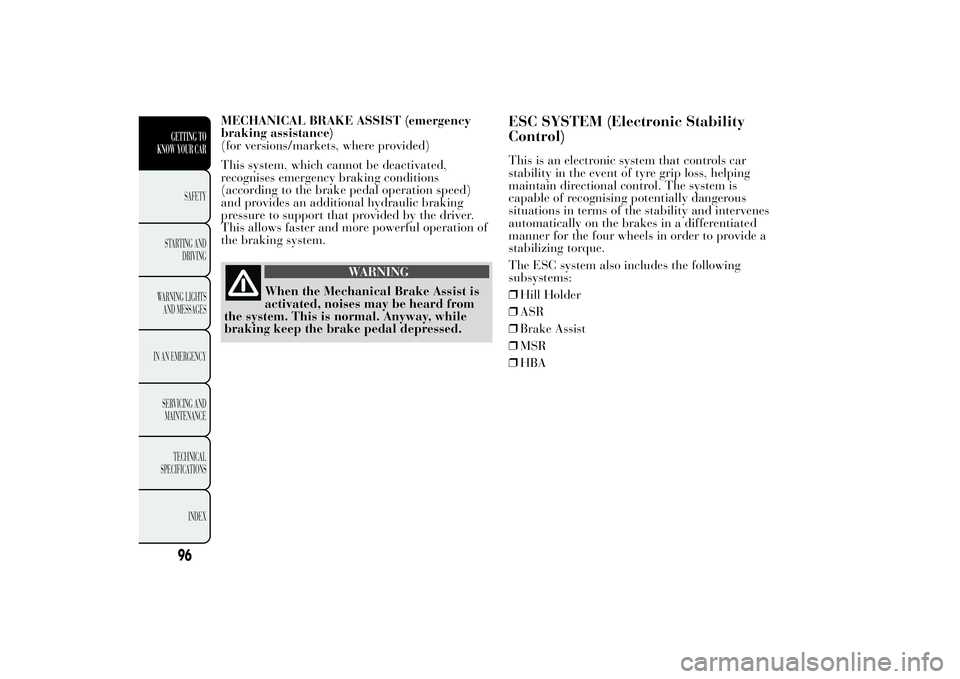torque Lancia Ypsilon 2014 Owner handbook (in English)
[x] Cancel search | Manufacturer: LANCIA, Model Year: 2014, Model line: Ypsilon, Model: Lancia Ypsilon 2014Pages: 315, PDF Size: 13.18 MB
Page 100 of 315

MECHANICAL BRAKE ASSIST (emergency
braking assistance)
(for versions/markets, where provided)
This system, which cannot be deactivated,
recognises emergency braking conditions
(according to the brake pedal operation speed)
and provides an additional hydraulic braking
pressure to support that provided by the driver.
This allows faster and more powerful operation of
the braking system.
WARNING
When the Mechanical Brake Assist is
activated, noises may be heard from
the system. This is normal. Anyway, while
braking keep the brake pedal depressed.
ESC SYSTEM (Electronic Stability
Control)This is an electronic system that controls car
stability in the event of tyre grip loss, helping
maintain directional control. The system is
capable of recognising potentially dangerous
situations in terms of the stability and intervenes
automatically on the brakes in a differentiated
manner for the four wheels in order to provide a
stabilizing torque.
The ESC system also includes the following
subsystems:
❒Hill Holder
❒ASR
❒Brake Assist
❒MSR
❒HBA
96GETTING TO
KNOW YOUR CAR
SAFETY
STARTING AND
DRIVING
WARNING LIGHTS
AND MESSAGES
IN AN EMERGENCY
SERVICING AND
MAINTENANCE
TECHNICAL
SPECIFICATIONS
INDEX
Page 101 of 315

SYSTEM INTERVENTION
It is signalled by the flashing of theESCwarning
light on the instrument panel, to inform the driver
that the car is in critical stability and grip
conditions.
SYSTEM ACTIVATION
The ESC system switches on automatically when
the engine is started and cannot be switched off.
HILL HOLDER SYSTEM
This system is an integral part of the ESC system
and facilitates starting on slopes.
It is activated automatically in the following
instances:
❒uphill: car stationary on a road with a gradient
higher than 5%, engine running, brake pressed
and gearbox in neutral or gear (other than
reverse) engaged;
❒downhill: car stationary on a road with a
gradient higher than 5%, engine running, brake
pressed and reverse gear engaged.
When setting off, the ESC system control unit
maintains braking pressure on the wheels until the
torque required for starting is reach or, in any
case, for a maximum of 2 seconds so that the right
foot can be moved easily from the brake pedal to
the accelerator pedal.When 2 seconds have elapsed, without any
departure having taken place, the system is
automatically deactivated, gradually releasing the
braking pressure. During this release stage, a
typical mechanical brake release noise can
be heard, indicating that the car is about to move.
IMPORTANT The Hill Holder system is not a
parking brake, therefore do not leave the vehicle
without activating the handbrake, switching
off the engine and engaging first gear.
ASR SYSTEM (AntiSlip Regulation)
It is an integral part of the ESC system. It
automatically operates in the event of one or both
drive wheels slipping, loss of grip on wet roads
(aquaplaning) and acceleration on slippery, snowy
or icy roads, etc…
Depending on the slipping conditions, two
different control systems are activated:
❒if the slipping involves both drive wheels, the
ASR intervenes reducing the power transmitted
by the engine;
❒if the slipping only involves one of the drive
wheels, it intervenes automatically braking
the wheel that is slipping.
97GETTING TO
KNOW YOUR CARSAFETY
STARTING AND
DRIVING
WARNING LIGHTS
AND MESSAGES
IN AN EMERGENCY
SERVICING AND
MAINTENANCE
TECHNICAL
SPECIFICATIONS
INDEX
Page 103 of 315

BRAKE ASSIST
The system, which cannot be turned off,
recognises emergency braking (on the basis of the
brake pedal operating speed) and speeding up
the response of the braking system. The Brake
Assist device is deactivated if there is a ESC
system failure.
MSR SYSTEM
(Motor Schleppmoment Regelung)
This system is an integral part of the ABS, that
intervenes, if there is sudden downshifting,
restoring torque to the engine, thereby preventing
excessive drive at the drive wheels which,
especially in poor grip conditions, could lead to a
loss in stability of the car.
START&STOP SYSTEMINTRODUCTION
The Start&Stop system automatically stops the
engine each time the car is stationary and starts it
again when the driver wants to move off. In this
way, the car efficiency is increased, by reducing
consumption, dangerous gas emissions and noise
pollution.
OPERATING MODES
Engine stopping mode
With the car stopped, the engine stops with
gearbox in neutral and clutch pedal released.
NoteThe engine can only be stopped
automatically after driving at a speed of more
than about 10 km/h, to prevent the engine from
being repeatedly stopped when driving at walking
pace.
The
symbol appears on the display when the
engine stops.
Restarting the engine
Press the clutch pedal to restart the engine.
99GETTING TO
KNOW YOUR CARSAFETY
STARTING AND
DRIVING
WARNING LIGHTS
AND MESSAGES
IN AN EMERGENCY
SERVICING AND
MAINTENANCE
TECHNICAL
SPECIFICATIONS
INDEX
Page 248 of 315

ENGINEVersions 0.9 TwinAir 85 HP 1.2 8V 69 HP 1.3 16v MultiJet
Engine code 312A2000 169A4000 199B1000
Cycle Otto Otto Diesel
Number and arrangement of
2 in line 4 in line 4 in line
Piston diameter and travel (mm) 80.5 x 86.0 70.8 x 78.86 69.6 x 82
Total displacement (cm³) 875 1242 1248
Compression ratio 10 11,1 16,8
Maximum power (EEC) (kW)
62,5/57
(*)
51 70
Maximum power (EEC) (HP)
85/77,5
(*)
69 95
corresponding engine speed (rpm) 5500 5500 4000
Max torque (EEC) (Nm)
145/100
(*)
102 200
Maximum torque (EEC) (kgm)
14,8/10,2
(*)
10,4 20,4
corresponding engine speed (rpm)
1900/2000
(*)
3000 1500
Spark plugs NGK PLKR9C8NGK ZKR7A-10 or
CHAMPION
RA8MCX4-
FuelUnleaded petrol 95
RON (EN 228 specifi-
cation)Unleaded petrol 95
RON (EN 228 specifi-
cation)Diesel for automotive
engines (EN 590 speci-
fication)
(*)With ECO button pressed
244
GETTING TO KNOW
YOUR CAR
SAFETY
STARTING AND
DRIVING
WARNING LIGHTS
AND MESSAGES
IN AN EMERGENCY
SERVICING AND
MAINTENANCE
TECHNICAL
SPECIFICATIONS
INDEX
cylinders